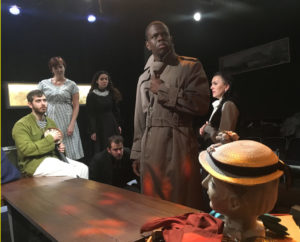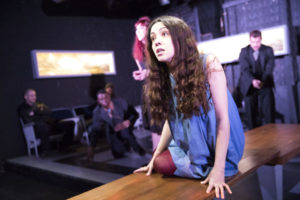
 [rating=3] Nobel Prize for Literature laureate Elias Canetti was known for his analysis of how totalitarianism interacts with the psychology of the masses. The German-language author’s reputation particularly rests on his philosophical book Crowds and Power, but he was also a prolific playwright. Now that questions about groupthink are again at the forefront of the public’s mind, the endlessly inventive Trap Door has the advantage of being experienced producing the works of central/eastern European makers from the past century. Their latest offering: The Locketeer, a new adaptation by director Catherine Sullivan of Canetti’s play The Numbered, which explores what would happen if everyone had a set lifespan. A lean seventy minutes, The Locketeer is a think-piece like the works of Caryl Churchill that, rather than follow a single person, is a series of vignettes speculating on the consequences of such a change.
[rating=3] Nobel Prize for Literature laureate Elias Canetti was known for his analysis of how totalitarianism interacts with the psychology of the masses. The German-language author’s reputation particularly rests on his philosophical book Crowds and Power, but he was also a prolific playwright. Now that questions about groupthink are again at the forefront of the public’s mind, the endlessly inventive Trap Door has the advantage of being experienced producing the works of central/eastern European makers from the past century. Their latest offering: The Locketeer, a new adaptation by director Catherine Sullivan of Canetti’s play The Numbered, which explores what would happen if everyone had a set lifespan. A lean seventy minutes, The Locketeer is a think-piece like the works of Caryl Churchill that, rather than follow a single person, is a series of vignettes speculating on the consequences of such a change.
Asking too many questions is likely to get one stoned to death, but the premise is this: when people are born, they are given a locket. The locket contains their designated day of death; until then they are untouchable, but afterward, their death is certain. There is an authority, the locket-keeper, who enforces this, and tampering with a locket is a taboo equal to murder. (Indeed, switching somebody’s locket with one that has a nearer date is the only way murder can be committed.) The designated day of death or “Moment” is supposed to be a secret, but it invariably leaks through mothers offering reassurances to their children, people leaking their own dates in attempts to find compatible mates or improve their social standing, and so forth. Of course, because the contents of the lockets cannot be checked, these numbers are often fake, but because they are so important, people soon wind up using their numbers in place of their names. Hearing someone introduce themselves as “Eight-eight” or “forty-six” or “ten” instantly tells you all you need to know about them.
Sullivan’s method of demonstrating the consequences of this is ingenious. She has cast ten actors, each with their own energy and ability to transform themselves into any kind of person with just a change of voice and posture. (Bob Wilson is especially notable for his ability to switch between a small boy and an old man.) We sometimes see the same characters reoccur, but in several scenes, the dialogue is between a speaker and the rest of the chorus, each of whom has adopted a distinct persona. In one conversation, we may see nine different children who expect to never live past ten, or a multitude of people reacting in terror, disgust, or skepticism when someone dares to question the rightness of the locket-keeper’s mission. Sometimes it is not clear whether actors are playing the same character from scene to scene, but that’s not a problem, since thematic links are more important. A conversation between Marzena Bukowska and Abby Blankenship’s characters over whether their allotted lifespans fundamentally change their potential is a pivotal moment in our understanding of this society works and echoes of it reverberate for the remainder of the play.
To help facilitate the rapid transformations Sullivan’s actors make, the designers have seized upon the concept of children play-acting. Ann Sonneville’s props and Rachel M. Sypniewski’s costumes are gathered in one of the seats and actors traverse a runway (set designer J. Michael Griggs) to reach it. This allows their energy to remain high throughout and they are generally characterized by an air of curiosity about the world they inhabit. There are a few times when an interaction is poignant or frightening, but for the most part, the characters themselves are interested in debating what perfect predictability means for how they should live their lives. Regarding the point about people being stoned to death for questioning the premise too much, there are few things which, upon reflection, are questionable about the way the locket-keeper’s will is enforced. But Canetti’s angle on totalitarianism in this instance wasn’t to investigate how the hard power of the state is utilized, but in how people enforce restrictions on themselves and each other in small ways. The play raises a lot of interesting points about how people plan for their futures and, not overstaying its welcome, invites the audience to reflect more on what assumptions are baked into how we judge other peoples’ choices and value.
The Locketeer runs through March 3 at Trap Door Theater, 1655 W Cortland, Chicago. Parking is available in the neighborhood.
 Running time is seventy minutes.
Running time is seventy minutes.
Performances are
Thursdays: 8:00 pm
Fridays: 8:00 pm
Saturdays: 8:00 pm
Tickets are $20-25, with 2-for-1 admission of Fridays.
To order, call 773-384-0494 or visit Trap Door Theatre.
To see what others are saying, go to Theater in Chicago, go to Review Round-Up and click at “The Locketeer”.






More Stories
“Mary Poppins : A Staged Concert” reviewed by Julia W. Rath
” I and You”
“Johnny Cobweb” reviewed by Mark Reinecke